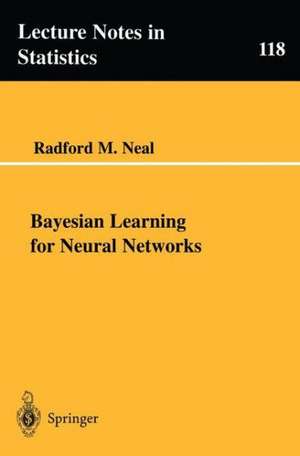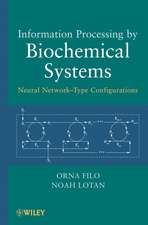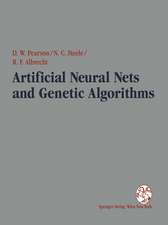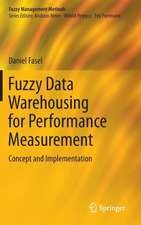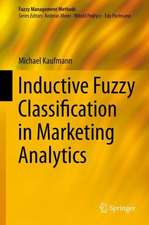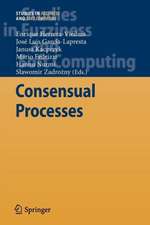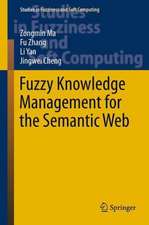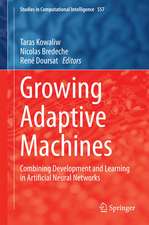Bayesian Learning for Neural Networks: Lecture Notes in Statistics, cartea 118
Autor Radford M. Nealen Limba Engleză Paperback – 9 aug 1996
Din seria Lecture Notes in Statistics
- 15%
 Preț: 631.86 lei
Preț: 631.86 lei -
 Preț: 385.84 lei
Preț: 385.84 lei - 17%
 Preț: 490.19 lei
Preț: 490.19 lei - 17%
 Preț: 460.28 lei
Preț: 460.28 lei - 18%
 Preț: 945.92 lei
Preț: 945.92 lei - 20%
 Preț: 561.42 lei
Preț: 561.42 lei - 18%
 Preț: 943.25 lei
Preț: 943.25 lei - 18%
 Preț: 943.25 lei
Preț: 943.25 lei - 18%
 Preț: 990.57 lei
Preț: 990.57 lei - 15%
 Preț: 641.38 lei
Preț: 641.38 lei -
 Preț: 428.67 lei
Preț: 428.67 lei - 15%
 Preț: 633.53 lei
Preț: 633.53 lei - 15%
 Preț: 658.88 lei
Preț: 658.88 lei -
 Preț: 383.33 lei
Preț: 383.33 lei - 15%
 Preț: 640.71 lei
Preț: 640.71 lei - 18%
 Preț: 947.18 lei
Preț: 947.18 lei - 18%
 Preț: 1007.35 lei
Preț: 1007.35 lei - 18%
 Preț: 942.63 lei
Preț: 942.63 lei - 15%
 Preț: 639.59 lei
Preț: 639.59 lei - 18%
 Preț: 1231.47 lei
Preț: 1231.47 lei - 15%
 Preț: 643.00 lei
Preț: 643.00 lei - 18%
 Preț: 886.62 lei
Preț: 886.62 lei -
 Preț: 383.12 lei
Preț: 383.12 lei - 15%
 Preț: 633.35 lei
Preț: 633.35 lei - 15%
 Preț: 635.65 lei
Preț: 635.65 lei -
 Preț: 393.74 lei
Preț: 393.74 lei - 15%
 Preț: 632.70 lei
Preț: 632.70 lei - 15%
 Preț: 637.28 lei
Preț: 637.28 lei - 15%
 Preț: 702.87 lei
Preț: 702.87 lei - 15%
 Preț: 642.68 lei
Preț: 642.68 lei - 15%
 Preț: 644.63 lei
Preț: 644.63 lei - 15%
 Preț: 645.14 lei
Preț: 645.14 lei -
 Preț: 382.36 lei
Preț: 382.36 lei - 15%
 Preț: 636.30 lei
Preț: 636.30 lei - 15%
 Preț: 647.92 lei
Preț: 647.92 lei -
 Preț: 380.63 lei
Preț: 380.63 lei - 18%
 Preț: 887.05 lei
Preț: 887.05 lei - 15%
 Preț: 634.32 lei
Preț: 634.32 lei - 15%
 Preț: 648.74 lei
Preț: 648.74 lei -
 Preț: 378.92 lei
Preț: 378.92 lei - 15%
 Preț: 648.56 lei
Preț: 648.56 lei - 15%
 Preț: 647.59 lei
Preț: 647.59 lei - 18%
 Preț: 780.37 lei
Preț: 780.37 lei - 15%
 Preț: 641.20 lei
Preț: 641.20 lei - 15%
 Preț: 643.16 lei
Preț: 643.16 lei -
 Preț: 384.70 lei
Preț: 384.70 lei
Preț: 1102.69 lei
Preț vechi: 1344.75 lei
-18% Nou
Puncte Express: 1654
Preț estimativ în valută:
210.99€ • 220.89$ • 174.59£
210.99€ • 220.89$ • 174.59£
Carte tipărită la comandă
Livrare economică 05-19 aprilie
Preluare comenzi: 021 569.72.76
Specificații
ISBN-13: 9780387947242
ISBN-10: 0387947248
Pagini: 204
Ilustrații: 204 p.
Dimensiuni: 155 x 235 x 10 mm
Greutate: 0.27 kg
Ediția:1996
Editura: Springer
Colecția Springer
Seria Lecture Notes in Statistics
Locul publicării:New York, NY, United States
ISBN-10: 0387947248
Pagini: 204
Ilustrații: 204 p.
Dimensiuni: 155 x 235 x 10 mm
Greutate: 0.27 kg
Ediția:1996
Editura: Springer
Colecția Springer
Seria Lecture Notes in Statistics
Locul publicării:New York, NY, United States
Public țintă
ResearchCuprins
1 Introduction.- 1.1 Bayesian and frequentist views of learning.- 1.2 Bayesian neural networks.- 1.3 Markov chain Monte Carlo methods.- 1.4 Outline of the remainder of the book.- 2 Priors for Infinite Networks.- 2.1 Priors converging to Gaussian processes.- 2.2 Priors converging to non-Gaussian stable processes.- 2.3 Priors for nets with more than one hidden layer.- 2.4 Hierarchical models.- 3 Monte Carlo Implementation.- 3.1 The hybrid Monte Carlo algorithm.- 3.2 An implementation of Bayesian neural network learning.- 3.3 A demonstration of the hybrid Monte Carlo implementation.- 3.4 Comparison of hybrid Monte Carlo with other methods.- 3.5 Variants of hybrid Monte Carlo.- 4 Evaluation of Neural Network Models.- 4.1 Network architectures, priors, and training procedures.- 4.2 Tests of the behaviour of large networks.- 4.3 Tests of Automatic Relevance Determination.- 4.4 Tests of Bayesian models on real data sets.- 5 Conclusions and Further Work.- 5.1 Priors for complex models.- 5.2 Hierarchical Models — ARD and beyond.- 5.3 Implementation using hybrid Monte Carlo.- 5.4 Evaluating performance on realistic problems.- A Details of the Implementation.- A.1 Specifications.- A.1.1 Network architecture.- A.1.2 Data models.- A.1.3 Prior distributions for parameters and hyperparameters.- A.1.4 Scaling of priors.- A.2 Conditional distributions for hyperparameters.- A.2.1 Lowest-level conditional distributions.- A.2.2 Higher-level conditional distributions.- A.3 Calculation of derivatives.- A.3.1 Derivatives of the log prior density.- A.3.2 Log likelihood derivatives with respect to unit values.- A.3.3 Log likelihood derivatives with respect to parameters.- A.4 Heuristic choice of stepsizes.- A.5 Rejection sampling from the prior.- B Obtaining the software.
